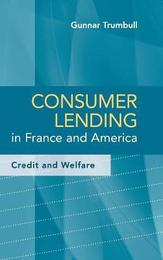
|
Consumer Lending in France and America: Credit and Welfare
Hardback
Main Details
| Title |
Consumer Lending in France and America: Credit and Welfare
|
| Authors and Contributors |
By (author) Gunnar Trumbull
|
| Physical Properties |
| Format:Hardback | | Pages:239 | | Dimensions(mm): Height 235,Width 156 |
|
| Category/Genre | Political economy
Economic history
Credit and credit institutions |
|---|
| ISBN/Barcode |
9781107015654
|
| Classifications | Dewey:332.743 |
|---|
| Audience | | Professional & Vocational | |
|---|
| Illustrations |
10 Line drawings, unspecified
|
|
Publishing Details |
| Publisher |
Cambridge University Press
|
| Imprint |
Cambridge University Press
|
| Publication Date |
11 August 2014 |
| Publication Country |
United Kingdom
|
Description
Why did America embrace consumer credit over the course of the twentieth century, when most other countries did not? How did American policy makers by the late twentieth century come to believe that more credit would make even poor families better off? This book traces the historical emergence of modern consumer lending in America and France. If Americans were profligate in their borrowing, the French were correspondingly frugal. Comparison of the two countries reveals that America's love affair with credit was not primarily the consequence of its culture of consumption, as many writers have observed, nor directly a consequences of its less generous welfare state. It emerged instead from evolving coalitions between fledgling consumer lenders seeking to make their business socially acceptable and a range of non-governmental groups working to promote public welfare, labor, and minority rights. In France, where a similar coalition did not emerge, consumer credit continued to be perceived as economically regressive and socially risky.
Author Biography
Gunnar Trumbull is the Philip Caldwell Professor of Business Administration at Harvard Business School. He received his AB from Harvard College in 1991 and his PhD in Political Science from the Massachusetts Institute of Technology in 2000. He has served as a Jean Monnet Fellow at the European University Institute in Florence, Italy and a Research Fellow at the Brookings Institution in Washington, DC. His research focuses on consumer politics in Europe and America. His previous books include Consumer Capitalism: Politics, Product Markets and Firm Strategy in France and Germany (2006) and Strength in Numbers: The Political Power of Weak Interests (2012).
Reviews'Trumbull pursues the problem of American indebtedness in ways unlike other books published on the subject, and his style is clear and reader-friendly. The central claim that emerges is counterintuitive, yet will make scholars working to understand modern credit markets wonder, like me, that no one had seen this before. Trumbull's argument is tremendously illuminating and largely persuasive. He has made a significant contribution to what we know about the history of consumer credit and its continuing social significance.' Lendol Calder, Augustana College 'This will be an important book, and it is an empirical gem on the development of consumer credit and the policies that regulate it in France and the United States. It suggests far-reaching implications for how ideas are born of material economic interests and then come to outlive the interest coalitions that gave rise to them. This book will help American readers understand the systemic dimensions of the credit predicament in which they find themselves.' Pepper D. Culpepper, European University Institute 'In his exploration of this divergence, Trumbull remains skeptical of the oft-cited link between consumerism and credit as well as the notion that credit expanded, especially to low-income groups, as the social safety net in the US began to fray in the 1980s. Instead, he traces the differences in outcomes to the emergence of different coalitions of social and political groups with varying degrees of acceptance of consumer credit ... Summing up: recommended.' S. Paul, Choice
|